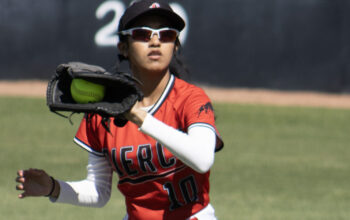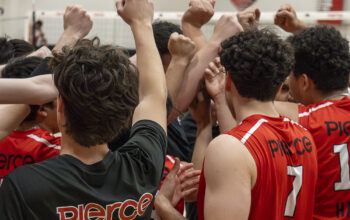Torry Hughes is now the defensive coordinator for the Pierce College football team, but when he was 11 years old he had to go through something that no sixth grader should have to go through.
He was living in South Los Angeles with his mother and grew up playing football in that area.
“Everybody loves football,” Hughes said. “I’m developing into a pretty good, little, skinny-skilled guy.”
There were times that his mother’s drug addiction would get bad and he would go back and forth between living with her in South Los Angeles and living with his father in Denver, Colorado.
It was during this time that he moved back to Colorado in the middle of the school year to a small town called Littleton. He can recall getting to his new school where he was one of four black students. The majority were predominantly caucasian.
At school the kids would play a game where they threw the ball up and they would try to tackle you. When you were caught the other kids would “open your legs and start mashing his nuts,” as Hughes recalls.
When they would play that game, everyone would get tackled at some point except for Hughes. So he would never be punished for getting tackled but he would always be part of giving the punishment. Never in a vicious way but just as a part of the game.
“I will never forget one day after the game we were going inside after recess and one of my best friends at the time was walking in and looked like he was hurt,” Hughes said.
The next week everyone who was playing in that game was getting called into the school’s office. Everyone except Hughes. He was getting nervous because he said he knew something was going on.
“His father was a lawyer and to make a long story short, the kid was urinating blood and they all tried to blame it on me,” Hughes said.
They called him into the office a week later and there were five members from the Littleton Police Department there with the administration of the school. A police officer then asked for Hughes to demonstrate what the game was and what happened.
“They are telling me I have assaulted this kid,” Hughes said. “There are all of these white men in a room with me who was 11.”
Hughes tried to demonstrate to the police officer what the game was.
“He lays me on my back and starts stomping on my nuts,” Hughes said. “He started going crazy to the point where everybody in the room had to pull him off of me. He was yelling, ‘is this what you did?’ I’ll never forget the rage in his eyes.”
An assault charge was filed against Hughes and his mother advised him to plead guilty to it and put it behind them. So he did.
“I plead guilty to something I didn’t even do,” Hughes said.
After that traumatic experience, Hughes started struggling with depression.
“As a little boy, you can find yourself alone,” Hughes said. “At that age you don’t know how to deal with your emotions.”
Hughes said he also has obsessive compulsive disorder as well as attention deficit disorder. He says that all of that overlapping led to more depression for him.
“I think one of the most unique things about human beings in our position in the universe is our wide range of emotions,” Hughes said. “We can go from hot to cold really fast. I think that sets us apart from anything in the animal kingdom.”
Hughes said that through his depression he is able to empathize with people and he can help them when they are going through a similar situation.
One of the biggest factors in bringing Hughes this far in life has been the game of football.
“Football is the greatest game that humans have ever come up with on the planet,” Hughes said. “It’s like an ever-evolving science. It’s like studying law or studying medicine. It keeps changing and it’s complex yet simple at the same time.”
“As an analogy, football is life,” Hughes said. “You can be down in the fourth quarter with three minutes left 28 to 7 and if you keep fighting you can find yourself the winner of the game. And that is life.”
Athletic director Bob Lofrano says that Hughes is an important part of the football program.
“He is really dedicated to make Pierce football a place where you would want to come and play,” Lofrano said. “He puts more than 100 percent effort into it, a lot of time and effort that he is not paid for. He really cares a lot about the program.”
“He played here at one time so he is a Brahma at heart and that is really nice to have,” Lofrano said.
Hughes played as a cornerback at Pierce College during the 99-00 seasons.
His daughter, also named Torry Hughes, is keeping the tradition strong and plays on the women’s volleyball team at Pierce.
“His military attitude comes home and he is very OCD and very clean and wants everything the way it is,” she said.
“I love my dad,” she said. “ I am a daddy’s girl. He is very hard working and he’s genuine. He is hard on his players but he has a lot of love for them and just wants to see them succeed.
Coach Torry Hughes hopes to see his team continue to evolve and improve and to become the top ranked team he knows they can be.



